Some of the most common questions new boaters or wanna-be boaters have are whether or not living on a boat in a marina is even possible. Can it be done, when is it okay, and what is it like?
To answer all those questions and more, here are some of the top Q+As. Living aboard can be a grand adventure, so let’s get started!
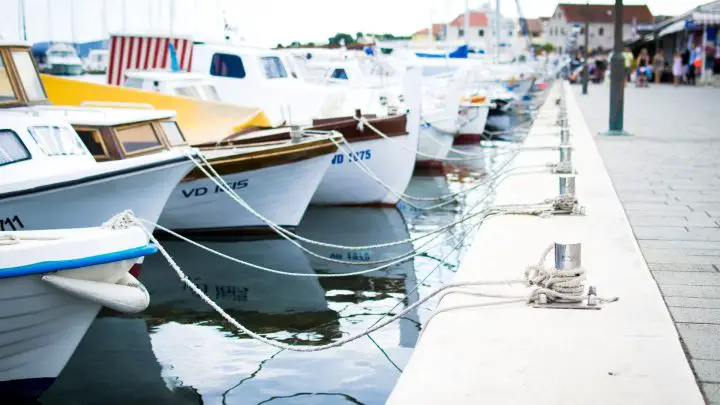
Table of Contents
- Living Aboard at a Marina—Good Idea or Not?
- What’s It Like in a Marina—Finding the Right One and the Marina Experience
- Tying Up at a Marina
- Living on a Boat in a Marina FAQs
Living Aboard at a Marina—Good Idea or Not?
Can you live on a boat in a marina?
In many cases, you can. But it always depends on the boat and the marina. Some marinas don’t want anyone staying on their boat, ever. Others only let short-term transient boaters stay aboard. Most are okay with transients staying on board for the length of their stay and the occasional weekend stay by locals.
Having no other home and staying on your boat in a marina is called living aboard, and that’s a little more complicated. Only a few marinas are okay with being your legal residence. These marinas usually already have an established liveaboard community and are very welcoming. In some parts of the country, however, there might be a long waitlist before you can get a slip at one of these places.
Why live at a marina?
For boaters, living at a marina is the most convenient in many ways.
Your monthly slip fees will include water and electricity, commodities that become difficult to come by (at least in quantity) once you leave the dock and live at anchor. Electricity is especially important when you need to run the air conditioning or heater.
But marinas also have parking for your car, an address where you can get packages and mail, showers, and laundry facilities. Some marinas have workshops and places where you can do boat projects. And most have crew lounges with couches, TVs, and workspaces with WiFi and desks. For full-time boaters, this is living the high life.
In many cases, marinas are also good places to stop and leave a boat for any weather. Being at anchor requires constantly paying attention to any storms brewing and deciding where the best place to be for the expected wind and waves might be. If you’re tied to a marina, life is a little easier because you’re just there. However, this isn’t to say that every marina is safe in any weather. Some marinas are in terrible locations, and many marinas get wiped out every storm season.
Why do marinas not allow liveaboards?
Some marinas do not allow liveaboards. It’s a fact of boating life. But what exactly a “liveaboard” is is often up for debate.
Marinas are businesses and are run as their owners what them to be. They lease their slips as they see fit—some marinas only lease annually to locals, while others only have slips available daily for transients. Some boats only cater to fishing boats, while others cater to cruising yachts. Some are mostly powerboaters, while others are entirely sailors. And with all these variations, some marinas have a little of everything.
Liveaboards are treated the same way—welcome in some places, tolerated in some, and banned at others. Generally, a marina that welcomes transient boaters expects that most of those boaters will stay on their boat while visiting. So, while cruisers live onboard, they aren’t necessarily “liveaboards” by the definition of most dock masters.
The liveaboards in question are those that live at the marina. They keep their car and get their mail there. They don’t have a physical house—their boat is their home, and they don’t go anywhere on it. This type of living aboard is often problematic for marina owners because it changes the vibe of the marina. If it’s a resort setting catering to high-end yachts and transients, having a community of full-time residents might not be the look they want. Again, it’s up to the marina and how they market themselves.
There’s also a reoccurring problem of neglected boats. Sometimes living aboard a boat seems like a good idea because living on a sailboat might be cheaper than any other waterfront property. But boats are maintenance hogs and actually very expensive. If they don’t have the time or money to maintain these boats, they become run-down eyesores quickly—not what marinas want to see.
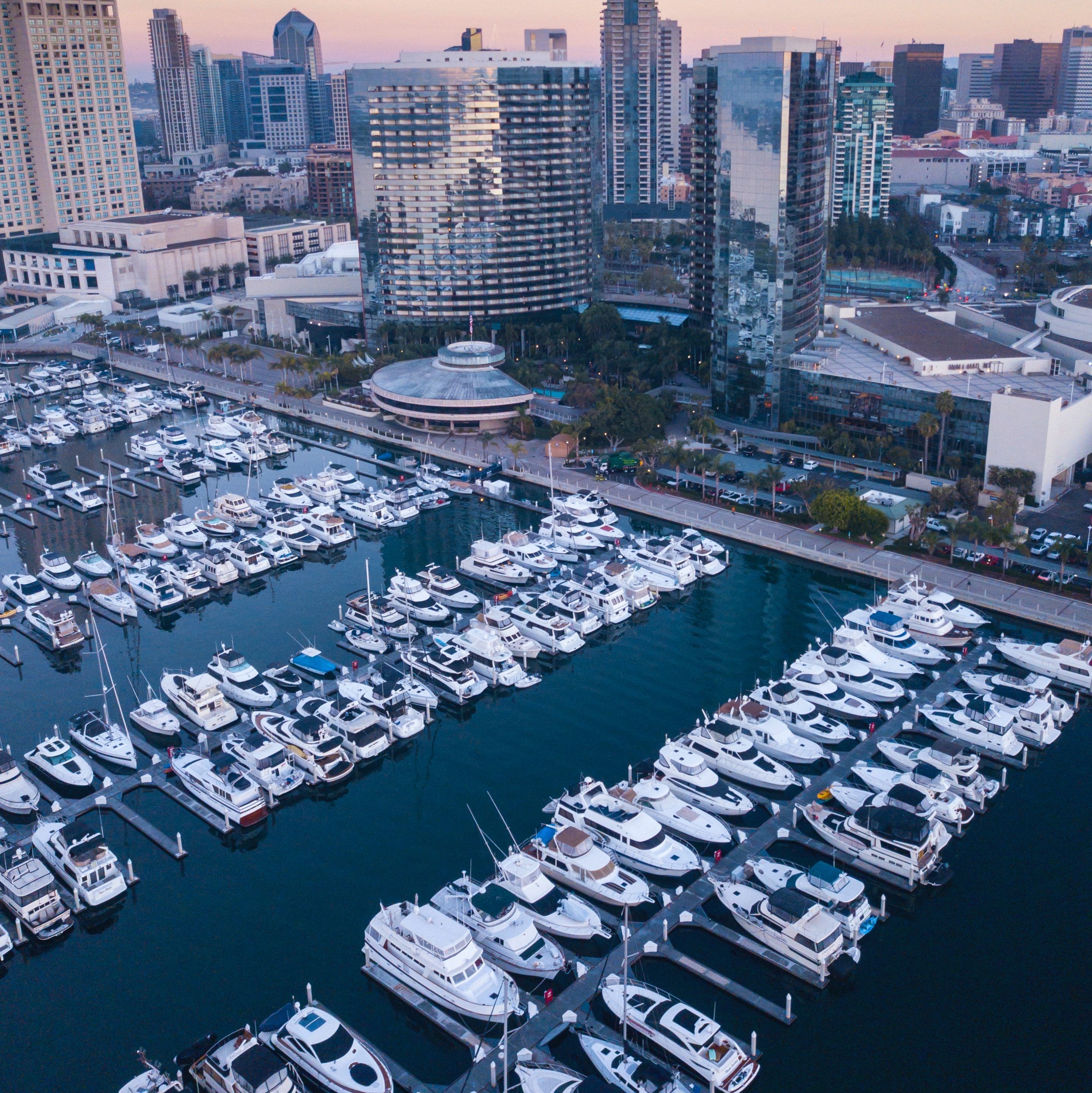
What’s It Like in a Marina—Finding the Right One and the Marina Experience
What are marinas like?
Every marina is different. Here are just a few different kinds of marinas you’ll find on the water.
- Workboat marinas—Mostly commercial work vessels, like tugs or fishing boats.
- Charter boat marinas—Mostly fishing and sightseeing charters, common on busy tourist-frequented waterfronts
- Transient boater marinas—Places with nightly slips for visitors. Some cities have free or discounted dockage to encourage boaters to visit.
- Municipal waterfront marinas—city-owned marinas are often a mixture of transient and commercial/charter boat marinas. Many have commercial real estate for restaurants and shops if it’s a tourist area.
- Resort or destination marinas—Fancy marinas that pull out all the stops. The best slips, amenities like a pool or beach access, spas, and others. It is sometimes associated with a resort property or sometimes a destination in itself just for boaters.
- Storage marinas—Just a place where locals keep boats. Rates may be annual leases only, and there might not be anyone on the property most of the time.
- Maintenance marinas—Docks associated with a repair facility. May have a boatyard with a Travellift to haul out larger vessels for work.
- In-out marinas—Marinas where the “slips” are actually “racks.” A forklift moves boats from the rack to the water on demand. Call ahead, say, “Put my boat in the water,” and arrive to find your boat floating and ready to go. You are limited to boats the size of the racks and small enough for the forklift.
- Yacht club marinas—Nearly always members-only, but they sometimes welcome members of other clubs.
- Liveaboard marinas—Marinas that allow long-term, full time liveaboards. It might be regular cruising boats, but sometimes barges, houseboats, or floating homes, too.
- Mom and pop marinas—The opposite of a big resort marina; the equivalent of a “mom and pop store.” Usually family-friendly, but quality and services vary dramatically from one place to another.
Or any combination of any of the above!
As a visiting boater, the only assurance you have when looking at a marina is that they offer services to boaters on the water. Some may be unable to accommodate your type of vessel because it’s too large or has too deep a draft. Only some marinas sell fuel, and only some have pump-outs. So you can’t just pull in somewhere and expect them to have space for you. You have to plan destinations in advance to find where you need to go for what you need.
The atmosphere at a marina and the quality of the service also varies. There are run-down dumps full of sinking boats. There are also posh five-star resorts with marina facilities.
Price isn’t always the best indicator of what to expect because marinas usually base their rates on the standard for the region and then adjust it from there. So, for the same money you’d pay in New York for a dump, you could get a five-star resort experience in rural parts of the Chesapeake Bay, for example.
Finding the right marina for you can be a challenge. Finding the one that allows you to do what you need to do while being in a place where you feel happy and comfortable is important.
One of the best things about boats is that they move. Don’t like the marina? Hate the owner? Does the guy two boats down give you the creeps? Untie the lines and leave, then! Find another place—you’re on a boat, after all! Your landlubber friends can’t escape their nasty neighbors nearly so easily.
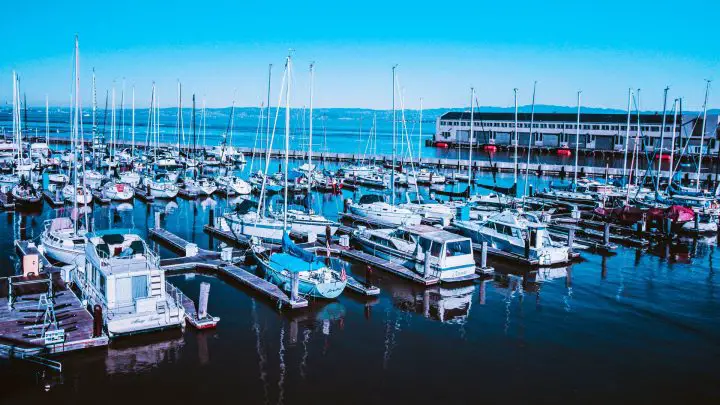
What’s everyday life like in a marina?
Day-to-day living at a marina depends entirely on the marina. Some are high-end resorts, while others are grungy, like seedy trailer parks on the water with nothing more than boat parking. What type of yachts use the marina and how long everyone stays can give clues as to what life is like there.
For the average cruiser on a sailboat or motor trawler, long-term living at a marina isn’t much different than living in an apartment complex or RV park. You share the dock with your neighbors and are in a pretty tight space. Since everyone has some common interests (at least, everyone likes boating, right?), casual conversations and friendly chit-chat take place on the docks and in the boater’s lounge every day. There might be organized events like potlucks and happy hour get-togethers in the more social marinas with active communities.
Other marinas have a different vibe and are much quieter. It all depends on the crowd and how often they see each other. Many times a marina might only have a handful of liveaboards spread out on different docks. In that case, living there might be very quiet indeed.
Most boaters at marinas live life as they would anywhere else. They keep a car and go to work or out to do their shopping. The boat can be treated like a floating condo as long as it is comfortable.
Much of your experience at a marina has to do with the boat you pick. The best sailboats to live on are great if you want to go sailing, but for living at a marina, it’s hard to beat a big power trawler or houseboat.
What’s it like living in a marina during winter?
Each area handles winter boating a little differently. In many areas where everyone boats year-round, living on a boat in the winter is no different than living on it in the summer. Except it’s colder and darker.
Living in place that has cold weather can be a challenge, but living on a boat can be really tough if you live in an area where a hard freeze is possible. Heating a boat requires a lot of energy since it isn’t well insulated. If you don’t heat it (or the power goes out), water lines can freeze, and hull fittings can crack. Many boats sink every winter because their owners do not take precautions. There are also many boat fires annually caused by faulty power cables as owners use their heaters and draw more power than they normally would.
But, drama aside, many folks live through winter on a boat, some in very cold places like Maine or the Pacific Northwest. The trick is having a plan to deal with freezing temperatures. Here are some tips.
Know how you’re going to keep your boat warm. Some boats are easier than others. Reverse cycle heating only works when the water temperature is above 40ºF. Electric heaters are an option but only work if the shore power is working. In a winter storm, the power might go out. Propane, diesel, or solid-fuel heaters are found on many boats in higher latitudes.
Have a plan for condensation. A boat’s headliners and walls can drip from moisture condensing on them during winter. This leads to many issues, including growing black mold and mildew everywhere. To keep it to a minimum, use dehumidifiers and encourage air movement as much as possible. Propane adds moisture to the air, so you should minimize its use. Finally, keep clothes and bedding away from the walls to keep them dry.
Keep your dock and deck ice and snow free. It’s easier said than done, but slipping and falling in the water would be a nasty experience.
Properly winterize your boat in case you do lose power and heat. If you don’t, the engine could be damaged. Hull fittings might leak come spring, and other raw-water systems, like your air conditioner, can also be ruined.
If the water might freeze, be ready with bubblers or other ice-prevention measures. Sometimes the marina does this; other times, it might be up to you.
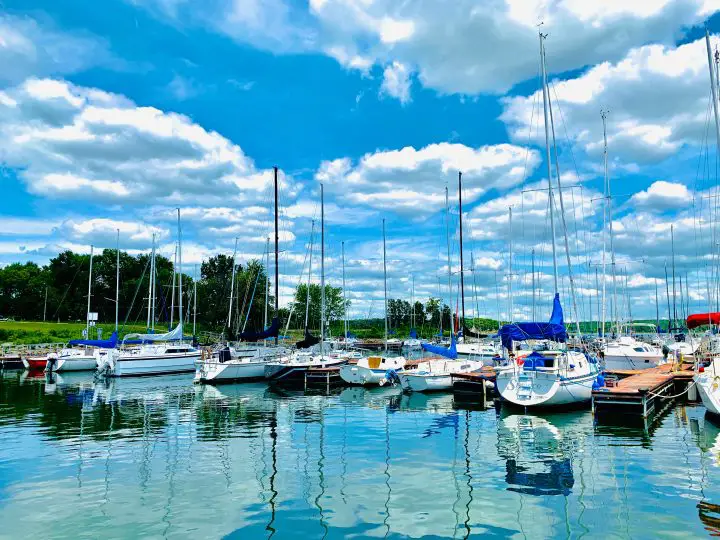
Tying Up at a Marina
Let’s wrap up marina life by recapping some of the pros and cons of living on a boat in a marina.
Pros Of Living In A Marina
- Fun, alternative lifestyle with a community of like-minded people
- Unlimited water and electricity=hot water, long showers, air conditioning
- Convenient land access—step off and walk, no dinghy rides (perfect for sailing dogs and their captains!)
- Shower, laundry, garbage/recycling, and lounge facilities
- Protected from storms (sometimes)
- Parking for your car
- Address for deliveries, packages, and mail
- For travelers who normally anchor, marinas provide a mental break from the planning required to move the boat
- Easy to load and unload things off the boat
Cons Of Life Aboard at Marinas
- Cost—liveaboard slip fees are higher (this will likely be the highest expense of the average cost of owning and buying a liveaboard sailboat, or even building a houseboat)
- Wifi or marina high speed internet access often stinks
- Closeness to neighbors/lack of privacy
- Limited airflow—no breeze since the boat can’t point into the wind
- Busy shared spaces—laundry, showers, bathrooms, boater’s lounge
- Challenging to do over winter
- Limited living space
- Dealing with boat maintenance constantly
- Managing your blackwater/pump outs
The takeaways look like this:
If you’re looking for a long-term residence, living on a boat in a marina might be a choice. But there are many downsides to living on a boat and finding a marina that will allow you to do it is just the first step. Boat life isn’t for everyone, and while some people really enjoy it, it can be a very difficult transition.
The picture is different if you’re a boater looking to travel and stay at various marinas. Many marinas make their money by leasing slips to visiting transients. There are enough in most places that boaters can travel along the coast and never have to spend a night away from the services of a marina unless they want to.
Keep in mind that a vast majority of boats in the world aren’t used for either of these scenarios! Most boats (and most marinas) are used for the occasional weekend outing. People seldom spend a night on these boats. In fact, a majority of boats hardly ever leave their slips! So most marinas are full of boats that are seldom used.
So, which style of boater are you? Do you long for seaside living and think a boat might be a fun way to afford it? Or do you want to travel and live at marinas for only a few days/weeks/months?
Living on a Boat in a Marina FAQs
Can you live full-time on a boat?
Living on a boat is not for everyone, but it can certainly be done. Boats require extensive maintenance and cost a lot to keep up. Living in them can be cramped and limiting, making even the most mundane tasks take forever. Finally, living on board means contending with limited power and water and dealing with tasks like waste pump-outs.
Do I need to know how to sail to live aboard?
Living on a boat and sailing a boat are two different topics. Most schools that teach you how to sail will not prepare you for living aboard. However, knowing how to operate and handle your vessel is vital to your safety and should not be overlooked.
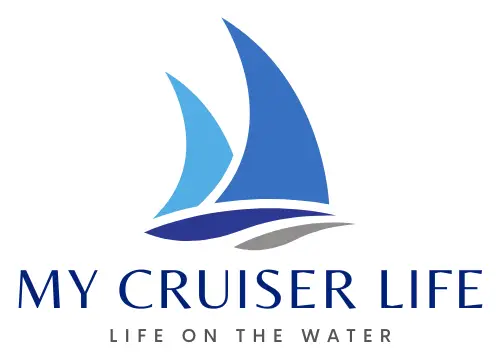
We are about to move on board our 46’ and excited! It’s going to be a tough transition so reading all I can. Thanks for the info!!